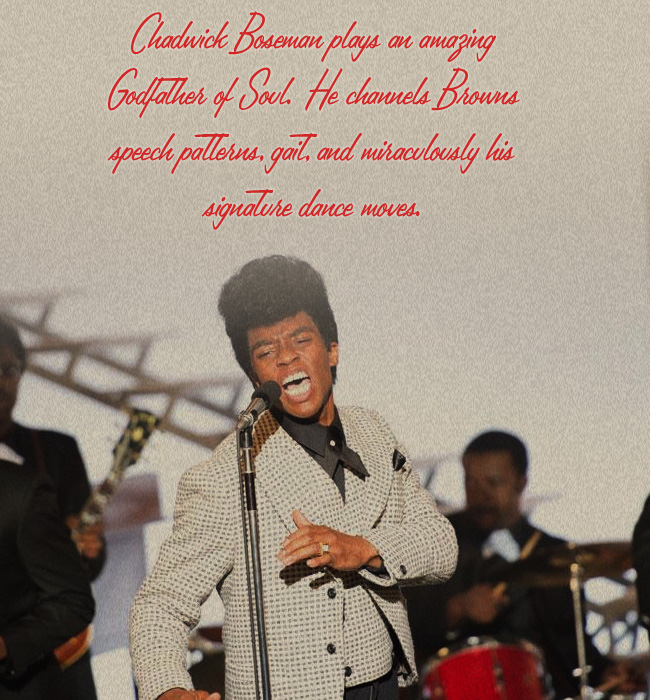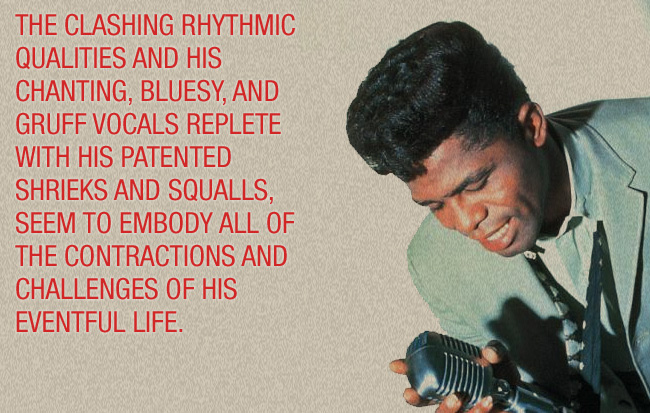Biographies—whether they are represented in books or films—are necessarily selective and reductive. If they weren’t we’d be subjected to 1000-page books or five-hour long movies on a single subject. And even then it would be impossible to capture all the nuance of a life, especially those that are large and impactful enough to warrant a treatment in the first place. Among the most illusory elements of any biography is the idea of “truth.” All lives constitute many truths. Distilling them into a cogent narrative demands that we make choices, share our story, and allow others writers to fill in the blanks by telling their own version of a subject’s truth.
With this realistic expectation, I think the new biopic about James Brown is great. Although the film is chronologically organized, it uses a very imaginative set of flashbacks to show how experiences from Brown’s early life shaped his personal habits, business instincts, and musical practices. Chadwick Boseman plays an amazing Godfather of Soul. He channels Brown’s speech patterns, gait, and miraculously his signature dance moves. Brown’s story is a compelling all-American one. Growing up in extreme and bone-crushing abject poverty in the South, he knew—like many others around him—abandonment, exploitation, violence, hunger, imprisonment and economic instability intimately.
Life taught him to hustle and be hard as a rock in order to simply survive. Yet within this crucible of hopelessness Brown also absorbed and found solace in the traditional music practices of downhome blues and gospel cultures. Driven to explore the artistic possibilities of combining past and present trends, Brown built a truly original powerhouse style—vocally, choreographically and with his bands. The film effectively depicts the painfully tense and abusive relationships he maintained with his closest and dedicated allies—his spouse, lovers, friends and bandmates. Ironically, these relationships can be thought to mirror the architectural structure of funk, the musical form Brown championed. The clashing rhythmic qualities and his chanting, bluesy, and gruff vocals replete with his patented shrieks and squalls, seem to embody all of the contractions and challenges of his eventful life.
Beyond the sheer joy of hearing many of James Brown’s iconic recordings through a cinematic sound system, one of the most moving elements of the film was how it depicted Brown’s artistic relationship with rocker Little Richard, played beautifully by Brandon Mychal Smith. Not only did it show his debt to Richard, their dialogue detailed the virtual mountain each had to climb to the top of the charts. Another important element highlighted in the film was Brown’s musical partnership and friendship with bandmate Bobby Byrd. A major supporter of Brown, Byrd’s dedication to his friend’s life project drives the narrative as he, over several decades, submits to the insufferably Alpha superstar’s abuses. It makes for an excellent study of platonic male relationships in the context of the cult of personality upon which our star system is built. I can’t think of many films that deal with black male friendships in the context of creativity. As someone who’s been in many bands, managing these relationships can be as important as getting the music right. (I wonder what Mick Jagger, front man of the iconic Rolling Stones and one of the film’s producers, would say about this point). Reliable accounts state that working with Mr. Brown wasn’t exactly a camel walk in the park. Musically, I hope that viewers notice how during the mid-sixties Brown successfully elided blues form and funk, by gradually deploying harmonic reduction to realize single chord verses, choruses, and bridges. Tin Pan Alley was a thing of the past.
Brown and his funk recipe have survived well into the era of hip-hop. He remains one of the most influential performers of the 20th century. And despite his flaws, many of them detailed in this film, his music remains foundational to pop industries around the world. Brown fundamentally changed our idea of popular song form. He was truly an imperfect and powerful example of the many contradictions that grew from the soil of American Apartheid.
James Brown, the miracle man got up, and the world is still listening.
Tags: black films, chadwick boseman, get on up, godfather of soul, James Brown, mick jagger



 Share On Facebook
Share On Facebook Tweet It
Tweet It







